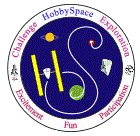|
Dennis Tito
Talks at the Air & Space Museum
Dennis Tito gave a lecture on January 26th
to an overflow crowd (that included this editor) at the National
Air & Space Museum in Washington D.C. He began by telling
the amazing story of how a space engineer turned investment
fund chief ended up making the trip to space that he never
would have had made if he had remained a space engineer.
He then provided a detailed overview of his
training, the launch, the week long stay on the station and
the return to earth. His presentation included several videos
and lots of beautiful pictures that he took of earth from
the station. He also responded to the many questions from
the audience with grace and wit .
The two strongest impressions that will remain
with this editor from the presentation was, first, Tito's
continual declarations of just how much fun he had in space
and, secondly, his refusal to pursue any further serious involvement
with space other than giving more such speeches to communicate
to the public how much fun space is.
Many critics of human spaceflight often depict
it as an ordeal to be endured. They speak as if astronauts
don't go into space of their own free desire but are "sent"
like soldiers into deadly combat. (This attitude can even
be seen in unexpected places such as the recent Red
Planet movie in which none of the astronauts expressed
anything other than a desire to get the mission over as fast
as possible and get back to earth.)
Tito's experience certainly refutes such attitudes.
He repeated over and over in many different ways just how
ecstatic he was during the entire mission. He was "in
heaven", the trip was "worth every penny",
it was the best week of his entire life, he said the age creases
in his faced deepened from smiling continually for a week,
etc., etc. This guy loved being in space and is sure most
other people would as well.
Yet, despite feeling profoundly rewarded by
the experience, he will not start investing in space businesses
such as in space tourism or reusable launch vehicles. (No
space angel he.) He
is now back to being a hard edged business man who doesn't
see a market yet and expects that it will be decades before
the ticket price to orbit drops to even a million dollars.
|



